U.S. interrogators have repeatedly sought to offend the religious beliefs of Muslim detainees as part of their interrogation strategy, Human Rights Watch said today.
Human Rights Watch said that the dispute over the retracted allegations in Newsweek that U.S. interrogators had desecrated a Koran at Guantánamo Bay, Cuba, has overshadowed the fact that religious humiliation of detainees at Guantánamo and elsewhere has been widespread.
“In detention centers around the world, the United States has been humiliating Muslim prisoners by offending their religious beliefs,” said Reed Brody, special counsel for Human Rights Watch.
On December 2, 2002, U.S. Secretary of Defense Donald Rumsfeld authorized a list of techniques for interrogation of prisoners at Guantánamo, which included “removal of all comfort items (including religious items),” “forced grooming (shaving of facial hair, etc.),” and “removal of clothing.” Each of these practices is considered offensive to many Muslims. These techniques were later applied in Afghanistan and Iraq as well.
The purpose of these techniques, Human Rights Watch said, is to inflict humiliation on detainees, which is strictly prohibited by the Geneva Conventions.
Several former detainees have said that U.S. interrogators disrespected the Koran. Three Britons released from Guantánamo have alleged that the Koran was kicked and thrown in the toilet. A former Russian detainee, Aryat Vahitov, has reportedly made the same claim. A former Kuwaiti detainee, Nasser Nijer Naser al-Mutairi, has said that the throwing of a Koran on the floor led to a hunger strike at Guantánamo that ended only after a senior officer expressed regret over the camp's loudspeaker. Human Rights Watch also interviewed detainees who described a protest at a U.S. detention site at Kandahar airbase in Afghanistan in early 2002 that was set off by a guard’s alleged desecration of the Koran.
Erik Saar, a former Army translator at Guantánamo, has described a female interrogator wiping a detainee with what the prisoner was made to believe was menstrual blood.
U.S. personnel have also used dogs as part of the interrogation process, which—in addition to inducing fear—many Muslims consider to be unclean. In December 2002, Secretary Rumsfeld approved “using detainees’ individual phobias (such as fear of dogs) to induce stress” at Guantánamo. Lt. Gen. Ricardo Sanchez, then the top U.S. commander in Iraq, authorized Abu Ghraib interrogators in September 2003 to “exploit Arab fear of dogs. ” The interrogators then used dogs on detainees in a manner that was captured in the Abu Ghraib photographs.
On Tuesday, White House spokesman Scott McClellan, referring to the “serious consequences” and “lasting damage” to the U.S. image, called on Newsweek to “help repair some of the damage” that was done by its report. But Human Rights Watch said that it was U.S. policies that had inflicted the greatest amount of damage.
Newsweek was not to blame for the damage inflicted in the riots, Human Rights Watch said.
“The damage in the riots was directly caused by violent protestors and poorly disciplined Afghan police and troops, not by Newsweek’s editors,” said Brody.
Human Rights Watch noted that the Newsweek story would not have resonated had it not been for the United States’ extensive abuse of Muslim detainees.
“If the U.S. government wants to repair the public relations damage caused by its mistreatment of detainees, it needs to investigate those who ordered or condoned this abuse, not attack those who have reported on it,” said Brody.
Common Article 3 to the Geneva Conventions, which sets out minimum requirements for the treatment of persons in armed conflicts, requires detainees to be treated humanely without adverse distinction based on religion or faith. Outrages upon personal dignity are prohibited, in particular humiliating and degrading treatment.








